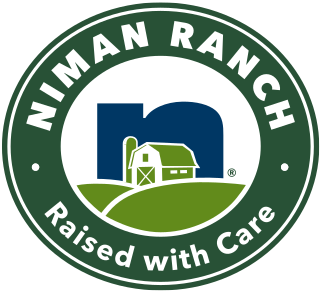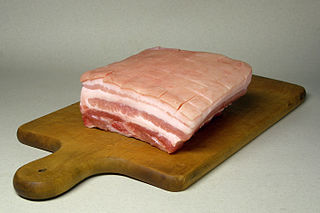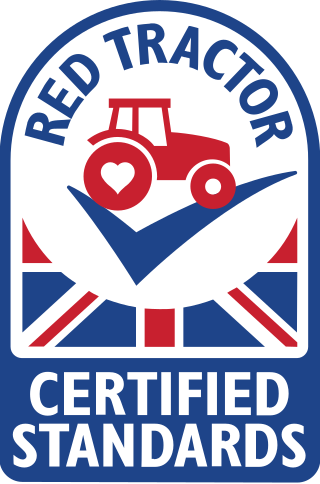Related Research Articles

Intensive pig farming, also known as pig factory farming, is the primary method of pig production, in which grower pigs are housed indoors in group-housing or straw-lined sheds, whilst pregnant sows are housed in gestation crates or pens and give birth in farrowing crates.
The National Farmers' Union (NFU) is an employer association representing farming and growing businesses within England and Wales.

Free range denotes a method of farming husbandry where the animals, for at least part of the day, can roam freely outdoors, rather than being confined in an enclosure for 24 hours each day. On many farms, the outdoors ranging area is fenced, thereby technically making this an enclosure, however, free range systems usually offer the opportunity for the extensive locomotion and sunlight that is otherwise prevented by indoor housing systems. Free range may apply to meat, eggs or dairy farming.
Seaboard Corporation is a diverse multinational agribusiness and transportation conglomerate with integrated operations in several industries. In the United States, the company mainly engages in pork production and processing and ocean transportation. Internationally, Seaboard is primarily engaged in commodity merchandising, grain processing, sugar production and electrical power generation. The parent company, Seaboard Corporation is based in the Kansas City suburb of Merriam, Kansas. Its subsidiaries include Seaboard Foods, Seaboard Marine, Seaboard Overseas & Trading Group (SOTG), Tabacal Agroindustria, Transcontinental Capital Corporation, Ltd. (TCCB), and Mount Dora Farms. It has 52.5% controlling interest in Butterball, LLC. Its principal operating divisions are pork, commodity trading and milling, marine, sugar, and power. More than 50% of the corporation is owned by members of its founding family, the Breskys.

NFU Mutual is a UK insurance composite. As a mutual, its policyholder members own the business, and the executives and directors are accountable to them. The full name of the organisation is National Farmers' Union Mutual Insurance Society Limited.
Smithfield Foods, Inc., is an American pork producer and food-processing company based in Smithfield, Virginia. It operates as an independent subsidiary of the multinational conglomerate WH Group. Founded in 1936 as the Smithfield Packing Company by Joseph W. Luter and his son, the company is the largest pig and pork producer in the world. In addition to owning over 500 farms in the US, Smithfield contracts with another 2,000 independent farms around the country to raise Smithfield's pigs. Outside the US, the company has facilities in Mexico, Poland, Romania, Germany, Slovakia and the United Kingdom. Globally the company employed 50,200 in 2016 and reported an annual revenue of $14 billion. Its 973,000-square-foot meat-processing plant in Tar Heel, North Carolina, was said in 2000 to be the world's largest, slaughtering 32,000 pigs a day.

Niman Ranch began in the early 1970s on an eleven-acre ranch in a small coastal town just north of San Francisco. They produce beef, lamb, and pork.
Intensive animal farming, industrial livestock production, and macro-farms, also known as factory farming, is a type of intensive agriculture, specifically an approach to animal husbandry designed to maximize production while minimizing costs. To achieve this, agribusinesses keep livestock such as cattle, poultry, and fish at high stocking densities, at large scale, and using modern machinery, biotechnology, and global trade. The main products of this industry are meat, milk and eggs for human consumption.

Pig farming, pork farming, or hog farming is the raising and breeding of domestic pigs as livestock, and is a branch of animal husbandry. Pigs are farmed principally for food and skins.
Pale, soft, exudative meat, or PSE meat, describes a carcass quality condition known to occur in pork, beef, and poultry. It is characterized by an abnormal color, consistency, and water holding capacity, making the meat dry and unattractive to consumers. The condition is believed to be caused by abnormal muscle metabolism following slaughter, due to an altered rate of glycolysis and a low pH within the muscle fibers. A mutation point in the ryanodine receptor gene (RYR1) in pork, associated to stress levels prior to slaughter are known to increase the incidence of PSE meat. Although the term "soft" may look positive, it refers to raw meat. When cooked, there is higher cook loss and the final product is hard, not juicy.

In New Zealand, agriculture is the largest sector of the tradable economy. The country exported NZ$46.4 billion worth of agricultural products in the 12 months to June 2019, 79.6% of the country's total exported goods. The agriculture, forestry and fisheries sector directly contributed $12.653 billion of the national GDP in the 12 months to September 2020, and employed 143,000 people, 5.9% of New Zealand's workforce, as of the 2018 census.

Agriculture in the United Kingdom uses 70% of the country's land area, employs 1% of its workforce and contributes 0.5% of its gross value added. The UK currently produces about 54% of its domestic food consumption.

The Irish pork crisis of 2008 was a dioxin contamination incident in Ireland that led to an international recall of pork products from Ireland produced between September and early December of that year. It was disclosed in early December 2008 that contaminated animal feed supplied by one Irish manufacturer to thirty-seven beef farms and nine pig farms across Republic of Ireland, and eight beef farms and one dairy farm in Northern Ireland, had caused the contamination of pork with between 80 and 200 times the EU's recommended limit for dioxins and dioxin-like PCBs i.e. 0.2 ng/g TEQ fat. The Food Safety Authority of Ireland moved on 6 December to recall from the market all Irish pork products dating from 1 September 2008 to that date. The contaminated feed that was supplied to forty-five beef farms across the island was judged to have caused no significant public health risk, accordingly no recall of beef was ordered. Also affected was a dairy farm in Northern Ireland; some milk supplies were withdrawn from circulation. Processors refused to resume slaughter of pigs until they received financial compensation.

Pork is the culinary name for the meat of the pig. It is the second-most commonly consumed meat worldwide, with evidence of pig husbandry dating back to 5000 BCE.
Cranswick plc is a leading UK food producer and supplier of premium, fresh and added-value food products. The company is listed on the London Stock Exchange and is a constituent of the FTSE 250 Index.

Danish Bacon was a brand under which Danish bacon was sold in the United Kingdom. The product had "Danish" stamped on the rind between wavy lines. The Danish farmers producing Danish Bacon and their co-operatives were represented by Danske Slagterier, whose UK subsidiary was the Danish Bacon and Meat Council. Danske Slagterier was absorbed into a Danish agricultural umbrella organisation in 2009. The majority of Danish bacon is produced through the farmer-owned co-operative Danish Crown. The co-operative system has low costs because of the scale and the elimination of the need for markets. Most of the production is for export.

Bacon and Hams is a 1917 book by George J. Nicholls, a member of the Institute of Certificated Grocers. The book details the then-modern bacon and ham industry beginning with the use of the pig breeds, meat processing and the distribution and pricing of cuts with a focus on the United Kingdom. The meat processing aspects focus on the popular Wiltshire cut of the time, but also includes American cuts as well. The book was described, with approbation, by the Saskatchewan Overseas Livestock Marketing Commission, as an "admirable and important treatise". Despite having entered the public domain, the book is rare and collectible and generated interest for its "unparalleled" anatomical details of pigs found in its fold-out pages.

Assured Food Standards is a United Kingdom company which licenses the Red Tractor quality mark, a farm assurance programme for food products, animal feed and fertiliser. Multiple cases of animal abuse have been reported on Red Tractor assured farms.

Agriculture in Wales has in the past been a major part of the economy of Wales, a largely rural country which is part of the United Kingdom. Wales is mountainous and has a mild, wet climate. This results in only a small proportion of the land area being suitable for arable cropping, but grass for the grazing of livestock is present in abundance. As a proportion of the national economy, agriculture is now much less important; a high proportion of the population now live in the towns and cities in the south of the country and tourism has become an important form of income in the countryside and on the coast. Arable cropping is limited to the flatter parts and elsewhere dairying and livestock farming predominate.

Minette Bridget Batters, Baroness Batters,, is a British farmer who was the president of the National Farmers' Union of England and Wales from 2018 to 2024. She has been a member of the House of Lords since 2024.
